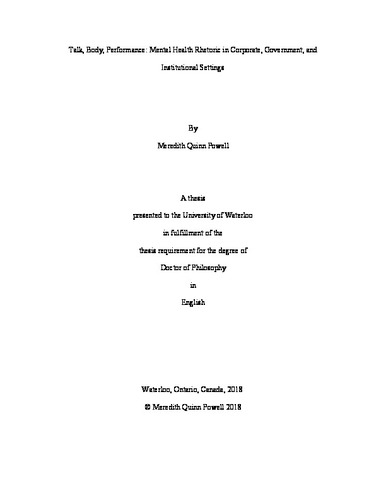| dc.contributor.author | Powell, Meredith | |
| dc.date.accessioned | 2018-09-17 16:11:04 (GMT) | |
| dc.date.available | 2018-09-17 16:11:04 (GMT) | |
| dc.date.issued | 2018-09-17 | |
| dc.date.submitted | 2018-11-23 | |
| dc.identifier.uri | http://hdl.handle.net/10012/13810 | |
| dc.description.abstract | Rhetorical studies in health and medicine often point out the ways in which medical empiricism is structured as an arhetorical entity. This dissertation delves into a rhetorical analysis of psychiatric illness through a study that considers how rhetoric informs how mental health is viewed, treated, and embodied in the present-day Canadian context. This study uses a combined methodological approach, merging classical concepts of rhetorical analysis from Aristotle with more contemporary conceptual theories by Kenneth Burke to Michel Foucault, within a disability studies framework. This approach is applied to examine how mental illness is rhetorically structured in corporate, government, and institutional settings. The major campaigns informing this study include the Bell Let’s Talk campaign, the Government of Canada’s E-Health initiative, Better Health Together, the institutional response to student suicide at the University of Waterloo, and Queen’s University's Jack Talks campaign. By bringing together various mental health campaigns that purport to end stigma, treat mental health, and work towards a mentally “healthier” society, this study seeks to formulate a framework that students and teachers can use to rhetorically assess mental health discourse without resorting to what Robert Crawford would call ‘healthist’ assumptions while concurrently encouraging the formulation of non-discriminatory practice. This dissertation argues that the mental healthcare campaigns call forth very specific forms of “talk,” performativity, and embodiment that shape, limit, and constrain the ways in which psychiatric disability is treated within a Canadian context. Through a rhetoric of self-care, healthcare is depoliticized and individualized; a constrained conceptualization of “good” mental health is shaped through corporate, government, and institutional campaigns. | en |
| dc.language.iso | en | en |
| dc.publisher | University of Waterloo | en |
| dc.subject | Rhetoric of Health and Medicine | en |
| dc.subject | Disability Studies | en |
| dc.subject | Rhetoric | en |
| dc.subject | Mental Health Rhetoric | en |
| dc.subject | Mental Health | en |
| dc.subject | Kenneth Burke | en |
| dc.subject | Aristotle | en |
| dc.title | Talk, Body, Performance: Mental Health Rhetoric in Corporate, Government, and Institutional Settings | en |
| dc.type | Doctoral Thesis | en |
| dc.pending | false | |
| uws-etd.degree.department | English Language and Literature | en |
| uws-etd.degree.discipline | English | en |
| uws-etd.degree.grantor | University of Waterloo | en |
| uws-etd.degree | Doctor of Philosophy | en |
| uws.contributor.advisor | Dolmage, Jay | |
| uws.contributor.affiliation1 | Faculty of Arts | en |
| uws.published.city | Waterloo | en |
| uws.published.country | Canada | en |
| uws.published.province | Ontario | en |
| uws.typeOfResource | Text | en |
| uws.peerReviewStatus | Unreviewed | en |
| uws.scholarLevel | Graduate | en |

